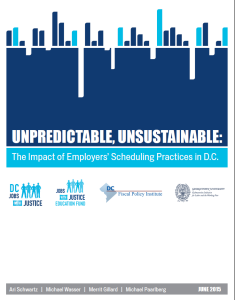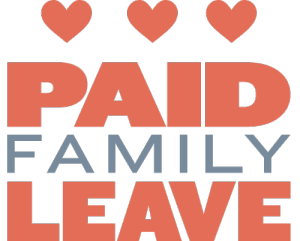Raising DC’s minimum wage to $15 an hour by 2020 is a big step to help workers thrive in DC, at a time when housing costs are rising but wages have been falling for residents without a college degree. The legislation — proposed by the mayor and approved last week by the DC Council — stands to increase wages for over 100,000 people who work in DC.
But we shouldn’t stop there. Beyond higher wages, many low-wage workers in the city’s restaurants and retail stores need more hours and more predictable sch edules. A bill now before the DC Council would address this. Another bill would provide paid family leave so that workers can take time off when they have a child or a sick relative — or when they are ill themselves — without facing financial hardship or job loss. The Council should move forward on these soon.
edules. A bill now before the DC Council would address this. Another bill would provide paid family leave so that workers can take time off when they have a child or a sick relative — or when they are ill themselves — without facing financial hardship or job loss. The Council should move forward on these soon.
Fair Scheduling
The Hours and Scheduling Stability Act of 2015 would require employers to offer additional hours to current employees first, before they look for a new hire. In addition, the bill would ensure that employees get advance notice of their schedules, and would require employers to provide additional pay if they change an employee’s schedule with short notice.
Last summer, 4 in 5 retail and restaurant workers said it was important to them to get more hours, in a survey and report from DC Jobs with Justice, Georgetown University, and DCFPI. The survey also found that most employees want a more predictable schedule. Encouraging and enforcing stable work scheduling practices would go a long way to helping hard-working DC residents provide for their families and do things like pursue education to advance their careers.
Paid Family Leave
The Universal Paid Leave Act of 2015, in its current form, would provide up to 12 weeks of paid leave for workers in DC to care for themselves, a new child, or an ill family member. The Council is currently reviewing the details and making revisions to the bill. Here are some things that are important to ensuring low-wage workers are able to take full advantage of the benefit.
- Family definitions should be expanded. The current bill wouldn’t allow someone to take paid leave to care for key family members, including parents, grandparents, and siblings.
- The wage replacement rate for low-wage workers should be at least 90 percent. Most low-wage workers will only be able to afford takin
 g time off — and thus have real access to paid family leave — if it replaces most of their wages.
g time off — and thus have real access to paid family leave — if it replaces most of their wages. - Workers should have their jobs protected. The proposed bill ensures that workers can return to their job after taking leave, but only if they have been at their job for a full year. Yet many low-wage industries have high rates of employee turnover, which means that many of these workers would not be able to take leave because they lack job protections.
- Paid leave should include as many DC residents as possible. The current bill excludes residents who work outside of the District or those working for city or federal government. This means that an estimated 40 percent of residents would be unable to access paid family leave benefits that would be beneficial to them and their families.
- Raise benefits over time if possible. If the paid family leave fund appears to be running a regular surplus, the Council should revisit the program’s design to expand benefits, including increasing the maximum length of assistance from 12 to 16 weeks.
The Council should act quickly to pass both of these important bills before the summer recess.
To print a copy of today’s blog, click here.
